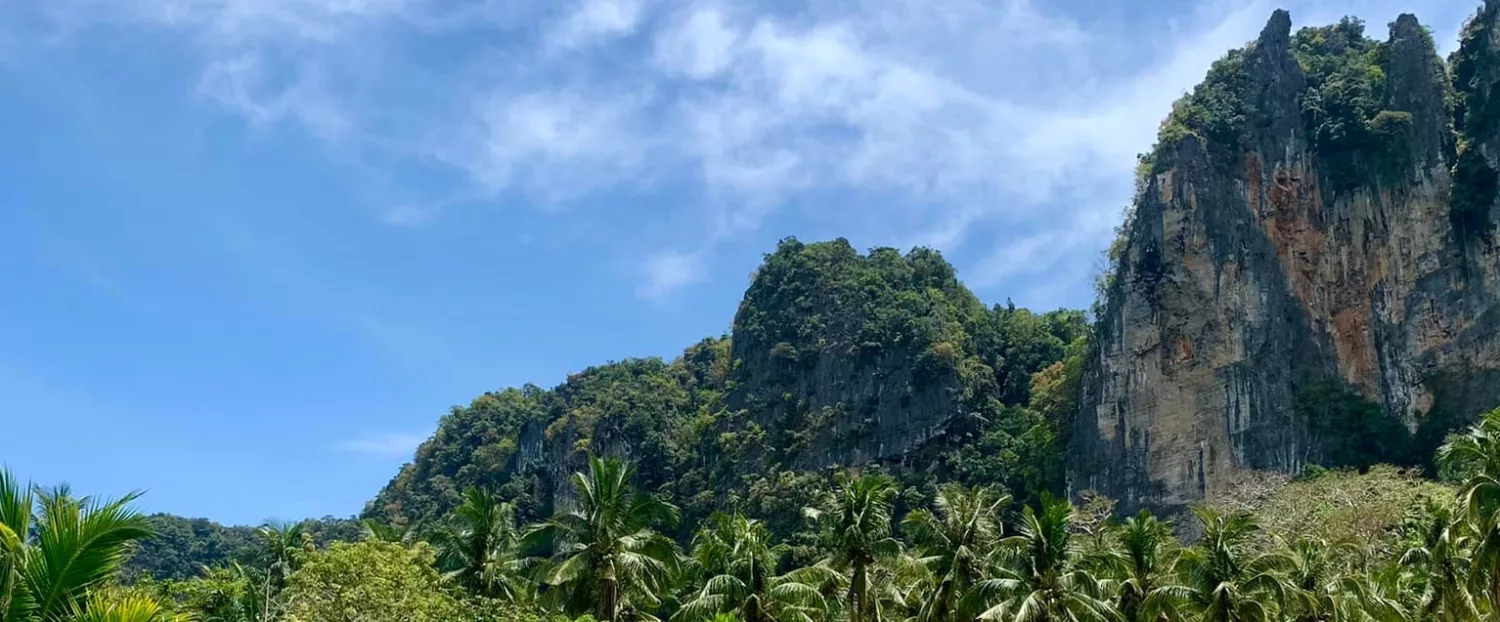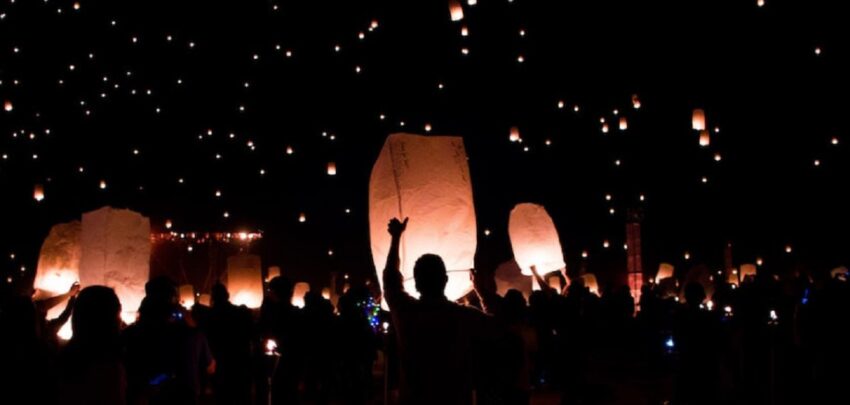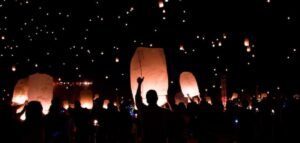
No matter the time of year, there is likely to be some sort of celebration, festival, or public holiday happening in the Land of Smiles. Continue reading to find out what observance is taking place during your next visit to Thailand.
1 January
Observed since 1944, New Year’s Day Celebrates the start of the solar and Gregorian year.
February – March Full Moon of the 3rd Thai Lunar Month
Magha Puja is a Buddhist festival and national Thai holiday celebrated on the full moon day of the third lunar month. This important festival celebrates an ancient gathering between Buddha and his disciples. Buddhists gather to celebrate the Sangha, that is the Buddhist community, and to pay merit, meditate, and listen to Buddhist teachings.
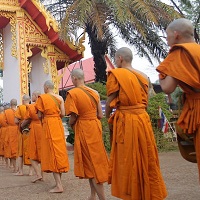
The intentions for the day are to make merit and cleanse the mind. Travelers visiting temples during Magha Puja are likely to see them lit up with candlelight processions, flowers, and incense filled with the Thai locals dressed in white robes and practicing the Buddha’s teachings and meditation.
Travelers wanting to drink alcohol on their vacation should know that the sale of alcohol is strictly prohibited during Buddhist holidays, and you won’t be able to buy it in markets or most restaurants. This doesn’t mean you won’t be able to get it in some places, but if you’re drinking in public, you do risk getting cited by the Thai police.
13 March: National Elephant Day (Wan Chang Thai)

Although National Elephant Day is not observed as a public holiday, many tourists come to Thailand wanting to add an elephant experience to their travel itinerary. Unfortunately, many individuals do not realize the grave effects of animal tourism and continue to perpetuate the abuse of elephants (see my post on ethical elephant sanctuaries).
National Elephant Day began in 1999 after recommendation by the Asian Elephant Foundation of Thailand. 13 March was chosen as the day of observance because this is the date in 1963 that the Royal Forest Department designated the white elephant as the national animal of Thailand.
6 April: Chakri Memorial Day (Wan Chakkri)
A National Public Holiday known as the “King Buddha Yodfa Chulaloke the Great Day” and “Chakri Dynasty Memorial Day”. Wan Chakkri memorializes the establishment of the Chakri Dynasty and the 1782 founding of Bangkok by King Phutthayotfa Chulalok.
Schools, banks, and government offices are closed on Chakri day to allow the Thai citizens to honor the Royal Family and express their patriotism. As Chakri Day is more of a ceremony for the King, many locals also take advantage of the holiday and use this time to enjoy with family and friends.
The memorial takes place at the Royal Pantheon in the Temple of the Emerald Buddha (Wat Phra Kaew) where King Rama X pays respect to his precursors and participates in several ceremonies to memorialize the Chakri Dynasty.
Wan Chakri is also the only day of the year where the public can visit the Royal Pantheon for 500 Bahts and view the life size statues of the eight former Chakri kings where the Thai royal family gathers for the day’s celebrations.
9 April: Traditional Thai New Year
In 1940, Songkran was transformed into a national holiday and the observance of the new year shifted to 1st January.
13–16 April: Songkran Festival, aka Thailand’s Water Festival
The Wan Songkran festival is a traditional celebration and time of transition and cleansing which coincides with the solar new year. Each region of Thailand tends to have their own set of celebration routines, but most of the festivities which tourists participate in, such as water fights, can be found throughout the country.
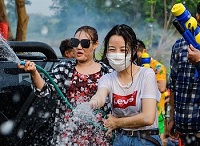
Songkran is a 3-day celebration, the first day is known as Wan Maha Songkran, the second as Wan Nao, and the third as Wan Thaloeng Sok. In the northern and eastern regions of Thailand, the Thai perform specific activities each day. These may include making merit at the temple, washing Buddha statues, and other celebrations which signify change, good luck, and growth towards enlightenment. The practice of sprinkling scented water on the hands of elders to signify respect, is also a common practice throughout Thailand.
While the traditional observance of Songkran continues, it has also morphed into a popular festival with tourists, many who come to Thailand just to participate in the wet, crowded, and drunken celebrations. The streets are lined with locals and visitors throwing water from cups, buckets, and even large super soakers which are sold on every block. The music is loud, and the drinks flow heavily. Chaing Mai, Bangkok, and Phuket are all great destinations for visitors wanting this experience.
14 April: Family Day
Many families reunite during this time. In 2018, Songkran was extended to seven days to allow for people to travel home for the holiday.
4 May: Coronation Day (Wan Chattramongkhon)
Another public holiday to celebrate the coronation of Thailand’s current King since 2019, King Rama X and his father, King Rama IX, who passed away in 2016. Coronation day was previously held on 5 May and cancelled in 2017 when King Rama X was still in mourning and re-established in 2019 to be held on 4 May. Coronation day is a day off for locals and schools and most businesses are likely to be closed.
Auspicious Date, May: Royal Ploughing Ceremony and Farmer’s Day (Wan Phuetchamongkhon)
A celebration to mark the beginning of the growing season. The day in which Wan Phuetchamongkhon) falls, is determined by an astrologer or a Brahman priest and announced by the Bureau of the Royal Household each year.
This tradition was reinstated in 1960 by King Rama IX and has been carried forward by King Rama X since 2019. The Royal Harvest festival begins at the Grand Palace in Bangkok where grains, mainly rice provided by the King, are blessed by Buddhist monks to keep them free from disease and provide good fortune.
The Royal Ploughing Ceremony follows the Royal Harvest Festival, taking place in Sanam Luang, an open field and public square in front of Wat Phra Kaew and the Grand Palace. One of the highlights of the Royal Ploughing Ceremony is the prediction of crop fertility for the coming year. In this ceremony, two oxen are critically selected based on health, very specific physical features, and behavior, then blessed by monks in preparation of the ceremony.
Dressed in red and gold, the oxen are circled around the grounds nine times (considered a lucky number in Thailand), attached to a wooden plow then led through the field while the filed priests follow behind sowing the rice blessed by the monks in the previous day’s Royal Harvest Festival. Remaining grains are dispersed to the local and attending farmers so good fortune may come to their crops as well.
After the oxen have performed their sacred duties, they are fed bowls of grains, vegetables, water and even rice whisky. It is believed that the food the oxen chose to eat will assist to the prediction of crop fertility, which is ultimately predicted by the court astrologers and Priest. If you wish to attend, head to Sanam Luang, located in front of Wat Phra Kaew and the Grand Palace, early in the morning on the day of the ceremony. As this is a religious ceremony, respectful attire is expected.
6th Full moon, May – June: 6th Thai lunar month Visakha Bucha Day (Wan Wisakhabucha)
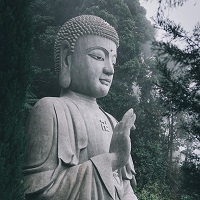
Public holiday and very important day for Thailand’s Buddhists. Visakha Bucha honors the birth, enlightenment and passing of the Buddha. The rituals and celebrations generally start a week before the full moon, and travelers may notice homes and businesses flying yellow flags and temples filled with locals coming to make merit and listen to teachings based on the Three Jewels of Buddhism- The Buddha, Dharma, and the Sangha.
Travelers that want to participate in these rituals must wear white and be appropriately covered. The sale of alcohol is prohibited on this public holiday.
3 June: Queen Suthida’s Birthday
National holiday with most government and bank branches closed in observance of Thailand’s current Queen. Travelers may notice streets lined with flowers, lights, and portraits in honor of the Queen. Alcohol may be purchased but drinking in public may be frowned upon out of respect for the queen.
28 July: King Rama X’s Birthday
Born in 1952 and crowned as King in 2019, 28 July is a public holiday to commemorate his life. Similar to his Queen’s birthday, streets are lined with flowers, lights, and portraits in honor of King Rama X, and firework celebrations can be enjoyed throughout the country.
Full Moon, 8th Thai Lunar Month (July): Asanha Bucha Day (Wan Asanha bucha)
National holiday in observance of Buddha’s first discourse, the Dhammacakkappavattana Sutta, recited to his five companions over 2,500 years ago in Deer Park, India. As is common during other Buddhist festivals and holidays, Asahna Bucha is also a day when temples are full of locals making merit and monks holding processions with lots of candles and incense.
First Waning Moon, 8th Thai Lunar Month (July): Vassa- Buddhist Lent (Wan Khao Phansa)
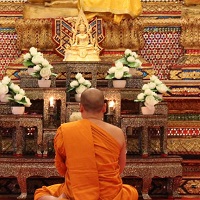
A three-month retreat observed by Theravada Buddhists from July to October. Historically, practitioners would commit to staying inside of the temple for the three months of the rainy season in order to not harm or kill insects while travelling through the fields. This period of time is used to meditate, receive discourse, and teach young monks. Some Theravada lay persons (Buddhist locals) also participate in lent by abstaining from alcohol and tobacco and by paying merit daily in their local temples. The sale of alcohol is prohibited on the first day of Vassa.
November-December Loy Krathong Festival
Celebrated on the evening of the 12th full moon of the Thai lunar calendar. Known as the Festival of Lights, Loy Krathong is one of Thailand’s biggest festivals of the year. Although Loy Krathong is not a public holiday, locals from around the nation gather around bodies of water to release floating lanterns and pay respect to Buddha and the Goddess of Water.
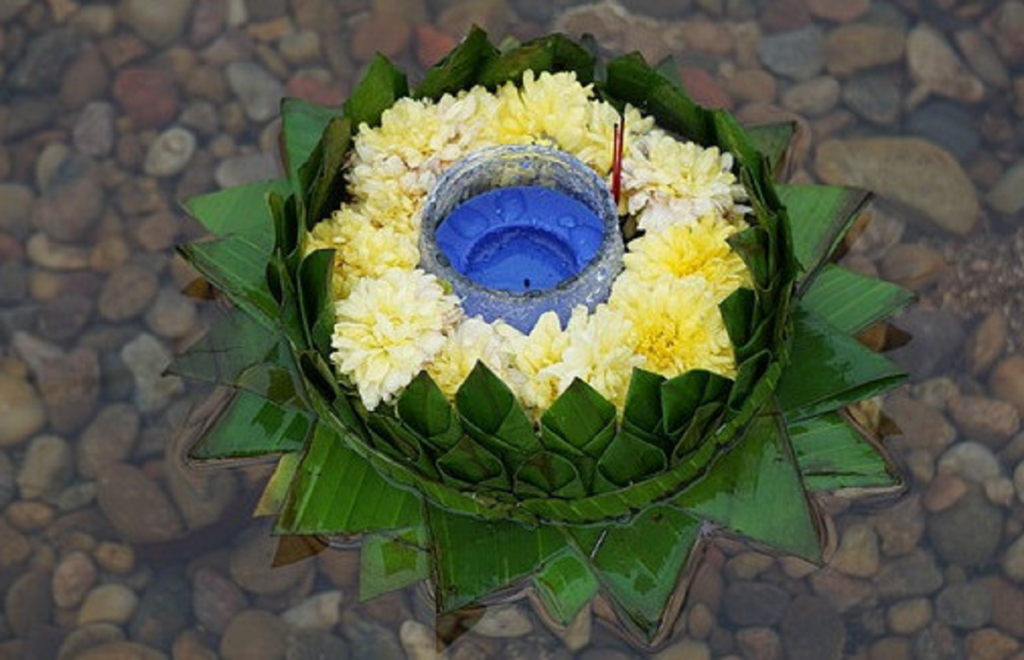
The Krathong, is the float made to carry light. Krathongs are generally made from banana leaves and decorated with flowers in the shape of a lotus. Traditionally, this is a way to pay respect to the Goddess of water and to thank her for the bounty she provides. Today, in addition to showing gratitude, releasing the Krathong symbolizes the release of negative energy and good fortune in the year to come.
There are many activities for visitors to participate in during this festival, such as taking in the culture, hearing traditional lore, and making your own Krathong. Visitors to Chiang Mai can witness the Khom Loi where lanterns are released into the sky along with one’s worries and hopes for good luck. If you’re in Thailand during November and December, participating in a Loy Krathong Festival is a must do.
5 December: King Rama IV’s Birthday
This national holiday commemorates the birth of Thailand’s beloved King Bhumibol Adulyadej (King Rama IV). Also observed on this day is National Father’s Day, and World Soil Day, in honor of the king for his work in soil science.
10 December: Thailand’s Constitution Day (Wan Ratthathammanun)
National holiday celebrating the declaration of the first permanent constitution in 1932.
31 December: New Year’s Eve (Wan Sin Pi)

The Land of Smiles really knows how to bring in the new year! All the large cities and many of the islands have celebrations lasting well into the early morning of the new year. Celebrations include parades, beach parties with fire dancers, lots of alcohol and firework displays that seem to last for hours. If you’re hesitant to visit Thailand to bring in the New Year because you don’t want to miss out on this tradition, do not worry. You might just end up having one of the best celebrations of your life. We brought in the 2023 new year on Phi Phi island and definitely had an amazing experience!
Conclusion
Let me know if you have any questions or just want to share ideas or your travel stories. Feel free to email me at cyanne@bestdestinationsthailand.com or leave a comment below. Together, we can share our experiences or just learn from others. The world opens to those with knowledge.
All the best,
Cyanne
